使用 Intellij IDEA 新建一个 Servlet 项目
写在前面
上一篇文章 在 Tomcat 上部署你的第一个 Servlet 应用 使用最原始的命令行方式编译 Servlet 类,并且部署到 tomcat 安装目录下的 webapps 文件夹下。但是实际情况下,我们现在的工作已经十分依赖集成开发工具 IDEA 了,本文就借助 IDEA 创建一个 Servlet ,并且在 IDEA 工具内通过 tomcat 来启动服务和本地调试。
项目地址
git clone https://gitee.com/kendoziyu/code-servlet-parent.git
其中,develop-servlet 就是本文的项目。
1.创建项目
首先 File -> New -> Project... 打开创建项目窗口
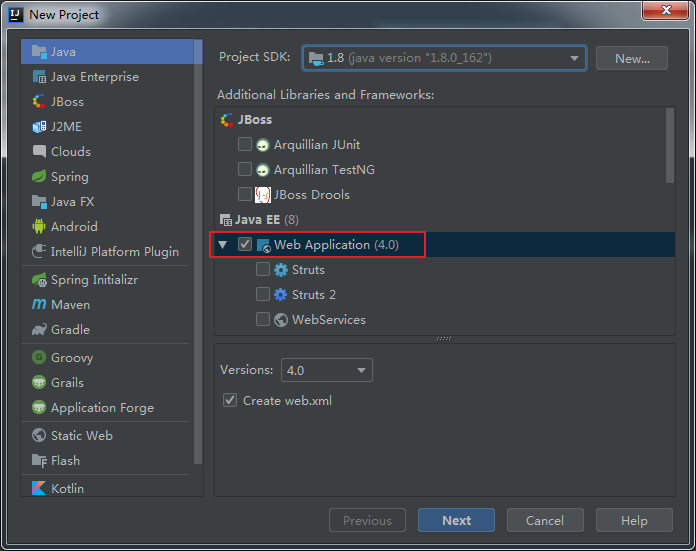
接着就是给你的项目找一个合适的名字和合适的路径,我的项目命名为 develop-servlet

点击 Finish 完成创建,并且在新的窗口中打开项目。
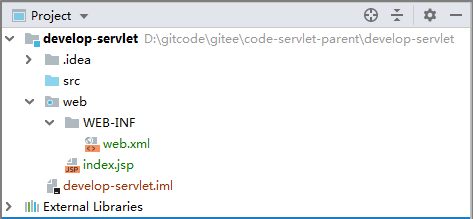
自动创建的模板,为我们创建了以下文件:
-
/web/WEB-INF/web.xml
-
/web/index.jsp
*自定义修改
首先,这个 web 文件夹的取名,不太符合我的习惯,我更喜欢命名为 webapp。
右击 web 文件夹 --> Refactor --> Rename...
另外,当前 3.1 是稳定版本,4.0 是 alpha 版本,所以我们稍稍改动一下 web.xml,把 servlet 版本改为 3.1
<?xml version="1.0" encoding="UTF-8"?>
<web-app xmlns="http://xmlns.jcp.org/xml/ns/javaee"
xmlns:xsi="http://www.w3.org/2001/XMLSchema-instance"
xsi:schemaLocation="http://xmlns.jcp.org/xml/ns/javaee http://xmlns.jcp.org/xml/ns/javaee/web-app_3_1.xsd"
version="3.1">
</web-app>
2.添加 Servlet 依赖
在 tomcat 安装目录下的 lib 下有 servlet-api.jar,而我的 tomcat 安装目录是 D:\server\apache-tomcat-9.0.39</span>

接着我们在 idea 中添加依赖库,我们先通过 File --> Project Structure... 打开窗口:

D:\server\apache-tomcat-9.0.39\lib\servlet-api.jar

3.创建 LoginServlet
package coderead.servlet;
import javax.servlet.ServletException;
import javax.servlet.http.HttpServlet;
import javax.servlet.http.HttpServletRequest;
import javax.servlet.http.HttpServletResponse;
import java.io.IOException;
/**
* JSP 页面的 Servlet
*
* @author kendoziyu
* @since 2020/10/21 0021
*/
public class LoginServlet extends HttpServlet {
@Override
protected void doGet(HttpServletRequest request, HttpServletResponse response) throws ServletException, IOException {
response.getWriter().write("<h1> Hello World </h1>");
}
@Override
protected void doPost(HttpServletRequest req, HttpServletResponse resp) throws ServletException, IOException {
super.doPost(req, resp);
}
}
4. 配置 web.xml
我们声明一个名为 loginServlet 的 servlet 对应类 coderead.servlet.LoginServlet,并且配置它的拦截 url 地址为 /Login
<?xml version="1.0" encoding="UTF-8"?>
<web-app xmlns="http://xmlns.jcp.org/xml/ns/javaee"
xmlns:xsi="http://www.w3.org/2001/XMLSchema-instance"
xsi:schemaLocation="http://xmlns.jcp.org/xml/ns/javaee http://xmlns.jcp.org/xml/ns/javaee/web-app_3_1.xsd"
version="3.1">
<servlet>
<servlet-name>loginServlet</servlet-name>
<servlet-class>coderead.servlet.LoginServlet</servlet-class>
</servlet>
<servlet-mapping>
<servlet-name>loginServlet</servlet-name>
<url-pattern>/Login</url-pattern>
</servlet-mapping>
</web-app>
5. 添加运行项
我们打算用 tomcat 的方式来运行我们的项目,首先我们要 Add Configuration...

然后在 Run/Debug Configuration 窗口,选择 Tomcat Server -> Local
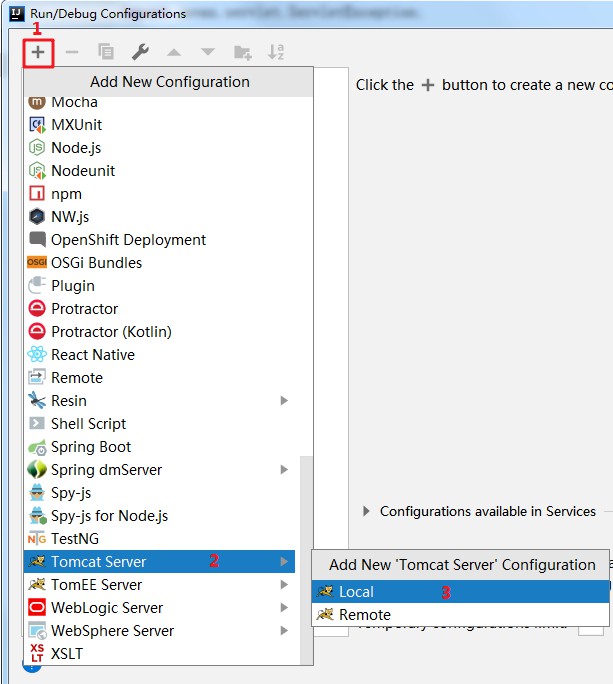
接着我们就需要设置应用服务器 Applicaiton Server:

点击 Configure... 打开了 Tomcat Server 窗口,我选择了一下本地 Tomcat 安装目录 D:\server\apache-tomcat-9.0.39,并选择 Ok
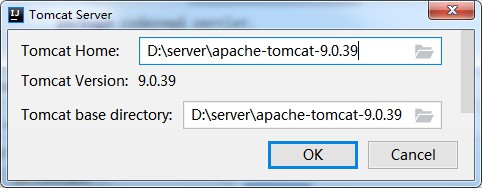
此时,在 Run/Debug Configuration 窗口出现一个 Warning: No artifacts configured

点击 Fix ,如果你的 IDEA 版本没有出现这个警告和 Fix 按钮,那也请不要慌张,选择 File -> Project Structure 即可。
6. 配置 Web Module
如果你不是用 idea 直接创建的 Web Application(比如是用 git clone 下来的代码,或者你自己手动创建的 webapp 文件夹),那你可以看一下,你的 webapp 文件夹上并没有一些“特殊的记号”。此时我们可以先添加 Web 模块,后创建 Artifact,这样会快很多。

如果你的 webapp 文件夹上已经有一个“小蓝点”,那你可能可以直接跳至第 7 步,前提是你确定你的配置是正确的。在 Project Structure 窗口下,选择 Modules
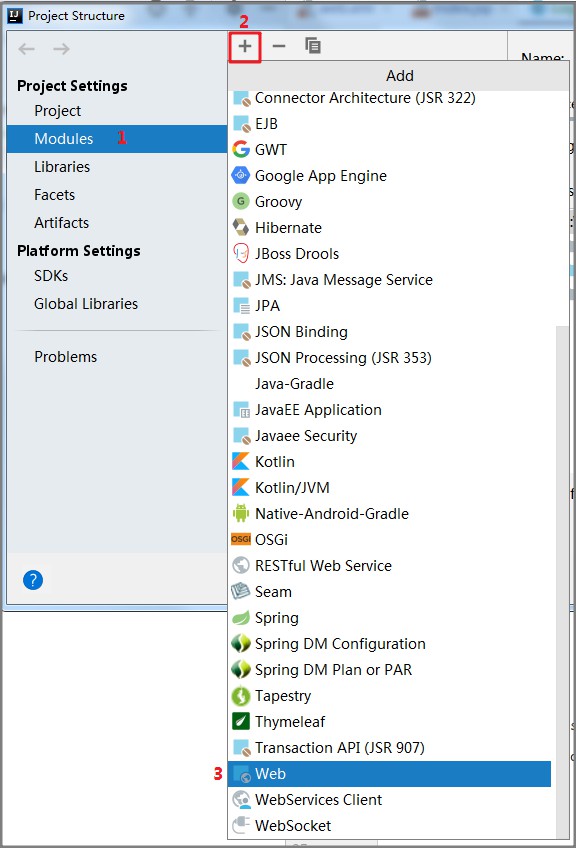
添加后效果如下图所示,接着我们要修改 Web Module Deployment Descriptor 和 Web Resource Directory。
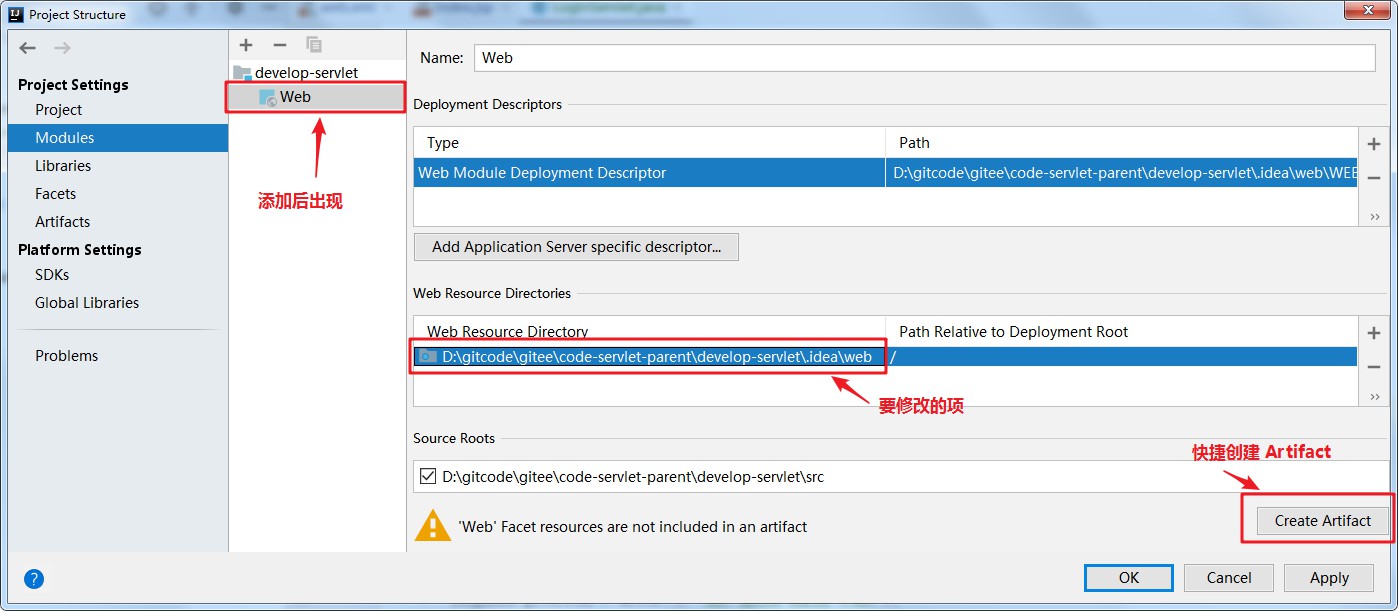
鼠标悬浮至 + 和 - 下方的 >>,会出现编辑按钮:

编辑 Web Module Deployment Descriptor 选择 项目根目录路径\webapp\WEB-INF\web.xml,版本选择 3.1 ,和 web.xml 中的版本一致。

编辑 Web Resource Directory,选择项目根目录下的 webapp 目录
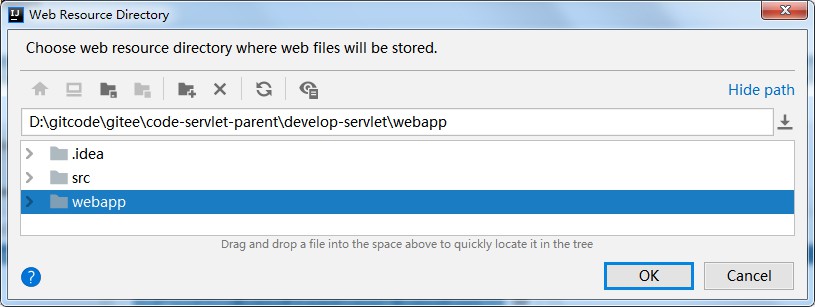
7. 创建 Artifact
如果你做了 6 步,那么你可以直接选择 Create Artifact。
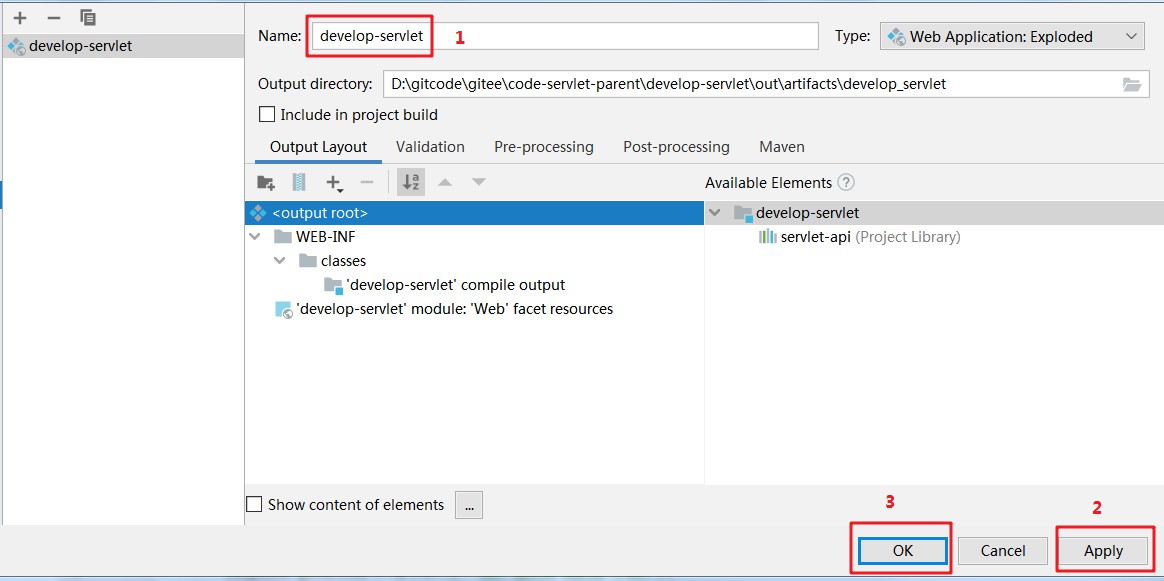
如果你不是用 Create Artifact 方式,那就需要你自己选择 Artifact 的类型:
如果选 Web Application: Exploded,这个是以文件夹形式(War Exploded)发布项目,选择这个,发布项目时就会自动生成文件夹在指定的 output directory;
如果选 Web Application: Archive,就是 war 包形式,每次都会重新打包全部的,将项目打成一个 war 包,放到指定位置;

8. 部署
再次选择 Add Configuration... ,打开 Run/Debug Configurations, + -> Tomcat Server -> Local ,切换到 Deployment,发现已经把 Artifact 自动添加进去了。

这里的 develop-servlet 是由第 7 步上面的图片 Artifact - Name 所决定的,同时也会影响 Web 项目的 ContextPath。第 7 步 Artifact 的 Output Directory 最终目录是 develop_servlet,因此 ContextPath 也是 develop_servlet。
也就是说我们应该在浏览器中通过 http://localhost:8080/develop_servlet/ 访问我们的项目。不加其他配置的情况 http://localhost:8080/ 的访问结果为 <span style="color:#E61A1A"404 Not Found。
* 选择输出目录
还是因为我是 git clone 得到的项目,没有配置输出目录,弹出这个报错:

我们可以在 Project Structure 窗口,配置 Project compiler output 为 项目根目录\out

9. jsp 调用 Servlet
首次打开时,会进入 index.jsp,如果没登录,我希望通过 jsp 调用 Servlet。
<%--
User: kendoziyu
Date: 2020/10/21
--%>
<%@ page contentType="text/html;charset=UTF-8" language="java" %>
<html>
<head>
<title>首页</title>
</head>
<body>
<%
String loginName = (String) request.getSession().getAttribute("loginName");
%>
<%
if (loginName == null || loginName.isEmpty()) {
%>
<a href="/Login">去登录</a>
<% } else { %>
Hello, <%=loginName%>
<% } %>
</body>
</html>
不过,此时点击“去登录”,直接跳转 http://localhost:8080/Login,结果 404 找不到页面,稍微改造一下:
方法一:可以修改链接地址为相对地址
<a href="Login">去登录</a>
适用场景:当前页面是在 WebRoot 路径下。
方法二:目标 URL 前面加上请求 ContextPath 前缀
<%@ page contentType="text/html;charset=UTF-8" language="java" %>
<html>
<head>
<title>首页</title>
</head>
<body>
<%
String loginName = (String) request.getSession().getAttribute("loginName");
String prefix = request.getContextPath();
%>
<%
if (loginName == null || loginName.isEmpty()) {
%>
<a href="<%=prefix%>/Login">去登录</a>
<% } else { %>
Hello, <%=loginName%>
<% } %>
</body>
</html>
10. Servlet 跳转 jsp
方法一: sendRedirect 方式
sendRedirect("/a.jsp");
可以将页面跳转到任何路径,不局限于web应用中,跳转的过程中url地址变化,无法使用request.setAttribute来传递。
方法二:forward 方式
request.getRequestDispatcher("/a.jsp").forward(request.response);
url地址不变,只能跳转到本web应用中的页面上。可以用 request.setAttibute 方法
我们改写一下 LoginServlet
package coderead.servlet;
import javax.servlet.ServletException;
import javax.servlet.http.HttpServlet;
import javax.servlet.http.HttpServletRequest;
import javax.servlet.http.HttpServletResponse;
import java.io.IOException;
/**
* JSP 页面的 Servlet
*
* @author kendoziyu
* @since 2020/10/21 0021
*/
public class LoginServlet extends HttpServlet {
@Override
protected void doGet(HttpServletRequest request, HttpServletResponse response) throws ServletException, IOException {
// response.getWriter().write("<h1> Hello World </h1>");
request.getRequestDispatcher("/login.jsp").forward(request, response);
}
@Override
protected void doPost(HttpServletRequest request, HttpServletResponse response) throws ServletException, IOException {
request.getSession().setAttribute("loginName", request.getParameter("username"));
response.sendRedirect("index.jsp");
}
}
login.jsp
<%@ page contentType="text/html;charset=UTF-8" language="java" %>
<html>
<head>
<title>登录</title>
</head>
<body>
<form action="Login" method="post">
username: <input type="username" name="username"> <br>
password: <input type="password" name="password"> <br>
<input type="submit" value="submit">
<input type="reset" value="reset"> <br>
</form>
</body>
</html>



【推荐】国内首个AI IDE,深度理解中文开发场景,立即下载体验Trae
【推荐】编程新体验,更懂你的AI,立即体验豆包MarsCode编程助手
【推荐】抖音旗下AI助手豆包,你的智能百科全书,全免费不限次数
【推荐】轻量又高性能的 SSH 工具 IShell:AI 加持,快人一步
· 开发者必知的日志记录最佳实践
· SQL Server 2025 AI相关能力初探
· Linux系列:如何用 C#调用 C方法造成内存泄露
· AI与.NET技术实操系列(二):开始使用ML.NET
· 记一次.NET内存居高不下排查解决与启示
· Manus重磅发布:全球首款通用AI代理技术深度解析与实战指南
· 被坑几百块钱后,我竟然真的恢复了删除的微信聊天记录!
· 没有Manus邀请码?试试免邀请码的MGX或者开源的OpenManus吧
· 园子的第一款AI主题卫衣上架——"HELLO! HOW CAN I ASSIST YOU TODAY
· 【自荐】一款简洁、开源的在线白板工具 Drawnix